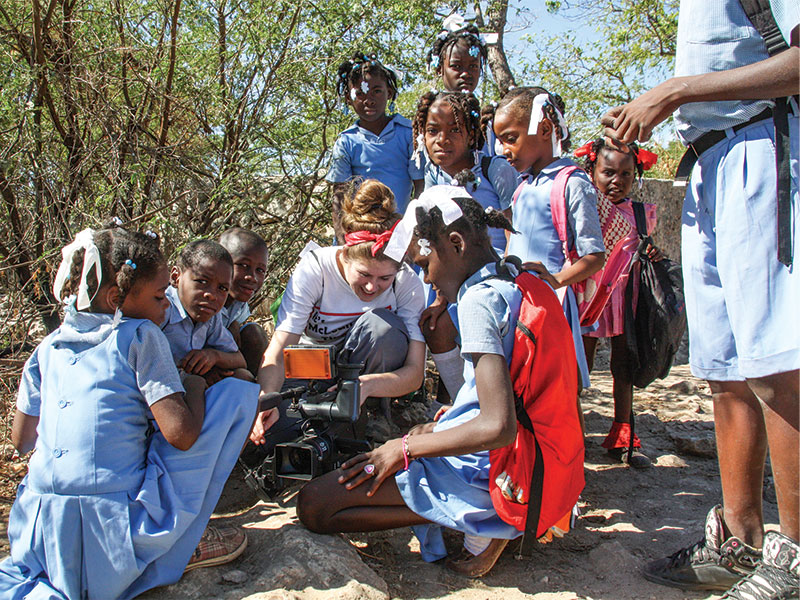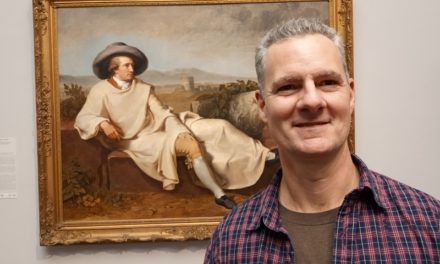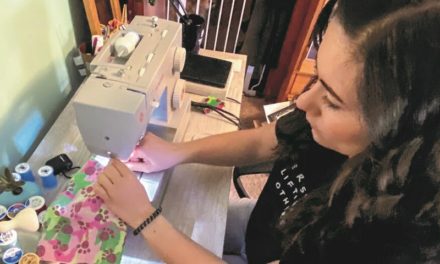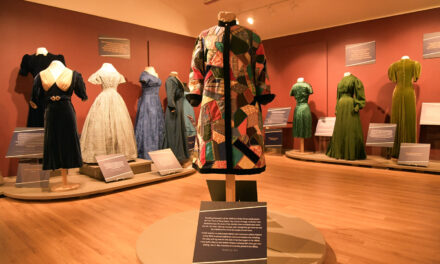This story first appeared in the Shippensburg University Magazine.
In the midst of a year seemingly full of negative headlines, a group at Shippensburg is celebrating some almost magical news.
Six years in the making, students, faculty, and alumni involved in Project Gros Mangles are seeing the fruits of their labor unfold in Haiti. A much-needed medical dispensary on a remote Haitian island opened to the public this spring, thanks to the results of a service-learning project initiated by Shippensburg’s Global Languages and Cultures Department. Now, residents of this isolated Caribbean island have access to quality health care in their community. Previously, the closest medical center was at least two hours away over difficult, mountainous terrain.
For nearly a decade, students from Shippensburg University have been providing service work for the community Gros-Mangles, a small village on the island of La Gonâve in the Republic of Haiti. The group has collaborated with the village to meet their most pressing needs, including a safe playground for children and the newly completed medical dispensary.
Although the pandemic thwarted the group’s annual trip to Haiti this past spring, they were thrilled to hear the dispensary was fully staffed and operating in June.
“This is a Ship family story,” said Dr. Blandine Mitaut, professor of global languages.
Outside the Comfort Zone
Ship students who participate in Project Gros Mangles witness firsthand a level of poverty that is unimaginable to most Americans. Yet, the students return home with a wealth of experience and insights gained through this service-learning opportunity.
Project Gros Mangles was started by Mitaut and the late Dr. Agnès Ragone, a retired professor of global languages. The two were searching for a service-learning project to get members of the French Club involved in issues that affect the French-speaking world. Each year, the group dives into Haitian culture and history before embarking on a service-learning trip.
For most, the trip to Gros-Mangles is a huge step outside of their comfort zone. In addition to the unfamiliar foods and social norms, students must manage without running water and limited access to electricity and the internet.
“Students witness extreme poverty from up close, with no possibility of escaping or ignoring it,” Mitaut said. “They have to grapple with their own, unearned privilege.”
“In spite of being relatively short, this experience is deeply transformative for our students,” she continued. “Students repeatedly comment that not a day goes by without them thinking about Haiti and the challenges of instability and poverty, not only there but closer to home as well.”
Haiti is the poorest nation in the Western Hemisphere. An estimated 80 percent of its residents live in poverty. “The Haitian people have very little,” Ragone said in a 2016 magazine article. “There is no running water, no electricity, no trash pickup. People often eat once a day because they don’t have enough food.”
But Haiti also has a long and distinguished history, overcoming many injustices wrought upon them by the outside world. Its people emerged from the only successful slave revolt in history to found the world’s first Black-led republic. Haitians have contributed beautiful art, music, and literature to the world.
“This is a small town in the US connecting with a small island in Haiti,” Mitaut said. “We’re growing relationships, growing something beautiful.”
Down to Business
In 2010, a 7.0 magnitude earthquake rocked Haiti to its core. In just minutes, the natural disaster injured or claimed the lives of 200,000 and left behind a wave of damage to an already impoverished nation.
Many members of the campus community showed concern for the Haitian residents, but Michael Celius ’15 was particularly affected. Celius immigrated to the United States from Gros-Mangles as a child. He followed his father, Jonas Celius, who had left Haiti in the 1980s during a time of upheaval. At the time, Ragone was providing pro bono translation services for their adoption paperwork.
Michael expressed grave concern for his native community, and wanted to help. Project Gros Mangles was created with a dual mission of improving the Gros-Mangles community while providing a valuable learning experience for Ship students.
Jonas attended an initial fact-finding mission with Ragone and Mitaut to assess the needs of the Gros-Mangles community. Mitaut noted how important it was to form a village committee and listen to what locals wanted and needed. One of the top priorities was creating a safe place for children to play.
“Not all residents have shoes,” said Andrew Hutchinson ’17, who attended four service trips. He explained that the island has rocky terrain that can hurt to step on and bacteria that can cause infection.
Construction of a school playground, the group’s first project, began at l’Ecole Presbterale in 2012 and was completed the following year. Any preconceived notions that Hutchinson had of being a “hero” were quickly dissolved on his first trip. “The Haitians are fiercely independent,” he said. “They don’t want to be thought of as charity cases. We are there as friends.”
It was hard work. Volunteers helped gather rocks and hand-mix concrete with buckets of water carried from a nearby well.
Ship volunteers worked side by side with local residents who were hired at fair wages. Hutchinson was very impressed with them. “It’s so hot, and there is so little shade. The locals worked all day, but we could work at most three hours at a time before we needed shade and water.”
Work crews received additional “supervision” from local children, who enjoyed interacting with the volunteers. “The kids thought it was hilarious that we got sunburn and would push on our skin,” Hutchinson said. “They also tried to braid my hair, which did not work so well.”
While in Gros-Mangles, the volunteers lodged with Jonas’s sister and her family. They were one of few local families with a generator and electrical outlets, providing a rare opportunity for students to charge their devices.
“They were wonderful hosts,” said Allison Hill ’14. “They wanted to help and serve us.”
The Celius women were up before dawn to prepare food. Most meals consisted of rice, beans, and plantains, with some locally caught seafood when it was available. There is very little fresh produce on the island, nor the means to refrigerate food.
Evenings were spent on the Celius porch enjoying music and conversation with the locals.
“Meeting the Haitian people was one of my favorite parts,” Hutchinson said. “Everyone was so friendly and welcoming. It’s a very communal and social place. Just to walk from one end of the village to the other takes forever, because you stop and talk to everyone.”
Building Trust
Students study Haiti’s interesting and complicated history and culture before attending trips. This helps them to build rapport with residents. It also helps that Ship work groups have returned to Haiti several times. “Some aid workers help for a week, then never come again,” Hutchinson said. “When we return, it really helps to build trust with them.”
“The Haitians thought we were getting paid to be there,” Hutchinson continued. “We told them that we actually paid for the opportunity to be there. I think it helped them trust us more.” Students must cover their own transportation costs and other trip-related expenses.
Volunteers returned in 2014 to pave and expand the playground, nearly doubling its size. The following year, the foundation for the medical dispensary was laid.
Construction can be a painfully slow process. Only six to eight volunteers can attend a trip, and funds must be secured for each project. All equipment and supplies, including fresh water, must be shipped ahead or delivered from the mainland.
“I’d be lying if I said it wasn’t a bit discouraging,” Hutchinson said. “But there has been a lot of progress from my first trip to my last. So much has improved.”
It would take five more trips to raise the medical dispensary walls, place the floors, and add a roof to the solar-powered building.
Construction was stalled beginning in 2018 when the US government issued a travel warning due to political unrest in Haiti. All group trips were canceled, but Jonas made several solo trips to keep the project moving. He also met with Haitian physicians to create a staffing plan, and he personally recruited a doctor to oversee the new dispensary.
“Simply put, there would be no Project Gros Mangles without Mr. Celius,” Mitaut said.
The Centre de soins communautaire Belval, eight years in the making, finally opened in June. The facility was dedicated in memory of Ragone, and bears her maiden name as a dual honor to her father, a former physician.
The medical staff has already provided emergency treatment and routine checkups for many patients, including the delivery of its first baby in July. In another case, one grateful dad watched as the doctor removed a stick that was stuck in his young son’s ear.
Excitement for the dispensary was tempered only by Ragone’s passing in February after a battle with cancer. While Ragone did not live to see the opening, Mitaut was able to update her on its progress and near completion.
“Never in our wildest dreams did we think the center would be what it is,” Mitaut said. “The fact that this is picking up and working is almost magical.”
Continuing the Experience
For many students, the learning experience continues after they arrive home. A second but equally important part of the Project Gros Mangles mission is to provide meaningful service, education, research, and cultural enrichment experiences for Ship students.
Taren Swartz ’19 first met Drs. Ragone and Mitaut when they visited her high school French Club to talk about an upcoming Haiti trip. Swartz decided to attend Ship in part because she wanted to participate.
Unfortunately, the trip Swartz was scheduled to attend was canceled due to the travel warning. It was devastating news for Swartz. But, she was so committed that she created a marketing campaign for Project Gros Mangles for her Honors capstone research project.
The campaign resulted in an attractive website and new project logo. Swartz also initiated partnerships with several nonprofits operating in Haiti for support of future service trips.
According to Mitaut, students majoring in biology, business, criminal justice, geo-environmental studies, international studies, political science, and psychology have participated in Project Gros Mangles trips.
“While in Haiti, mornings are spent participating in the service project, and afternoons are reserved for visits and class activities,” Mitaut said. “Students also collect data for their research projects.”
Students pursue a major-related research topic, such as deforestation, the Haitian education system, and the place of women in Haitian society. Upon return, students complete their research, which they share with the Ship community at the Minds@Work conference in April. The annual event features the achievements of undergraduate and graduate students from all disciplines.
Hill produced the documentary, A Project for Haiti, for her senior communication/journalism class. The documentary provides marketing for the group, and it also helped Hill secure her first job as a photojournalist in television news.
Effective marketing is key to the success of Project Gros Mangles. They depend on contributions from members of campus and the community to fund future construction projects.
“Frankly, Haitians can spare our untrained hands and lack of experience,” Mitaut said. “What they need is the money.”
The group has no plans to stop. They are currently raising an additional $20,000 for the medical dispensary to purchase a generator, more solar panels, and to start an ambulance service. Efforts also are underway to raise $35,000 annually to sustain the dispensary’s operations.
“Ultimately, I hope that people will come to see Haiti as more than just a poor country in the Caribbean,” Hutchinson said. “It’s a wonderful place, and I am so glad that I got to experience this.”
How to Help
To learn more about Project Gros Mangles or to make a donation, visit projectgrosmangles.com.





